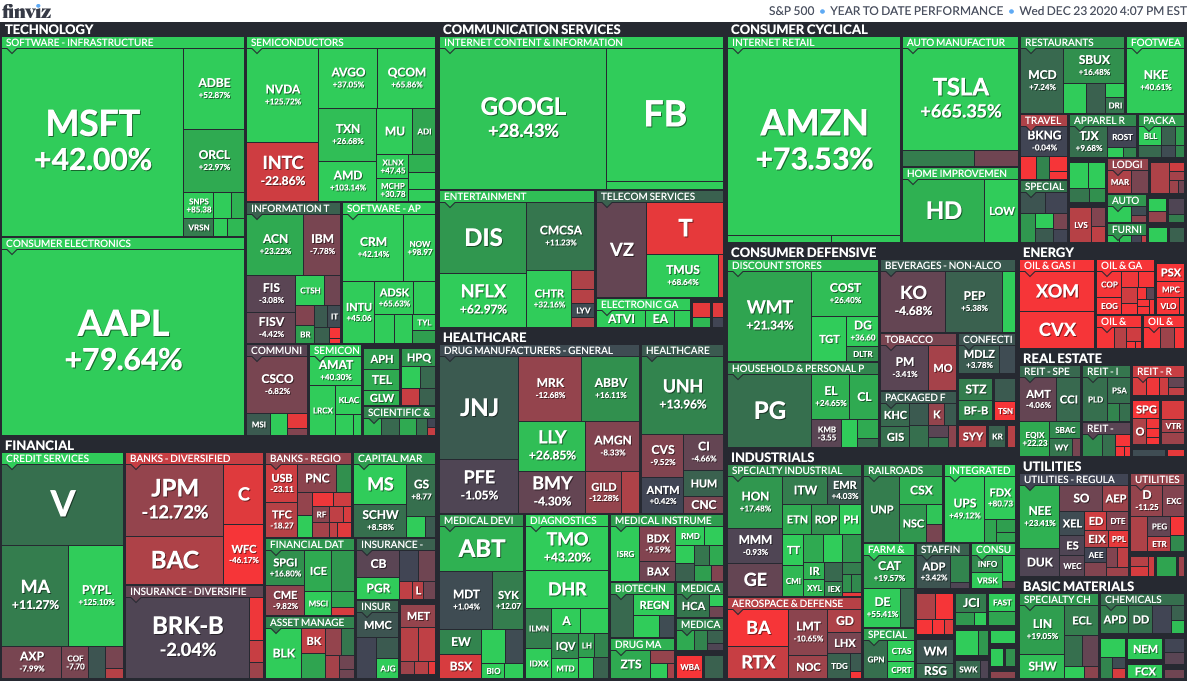
While some was expected — and some not so much — I hope you found plenty of moments of joy in 2020.
Now I won’t speculate on what 2021 might look like, but, in an attempt to keep this year-end lookback on the unbiased side, let’s take a look at some financial industry impacts.
1. Markets
It’s sure been an interesting year for financial markets. After starting the year at record highs, the pandemic-related sell-off in March caused significant drops. Since those lows, the stock market has rebounded — and it’s left people wondering why. In the wise words of Jason Speciner, “The market tries to predict the future.” And while some parts of the economy continue to struggle due to individuals being unemployed and businesses being limited via safety orders, the market continues to paint a rosy picture.
As Josh Brown explained in an episode of The Indicator podcast from NPR, “The stock market is not a great reflection of the actual economy. What the stock market does a really good job at is serving as a reflection of a group of very large corporations. And if that sounds very far away from real life, it is.”
Some mega-capitalization companies within the financial markets proved to be the winners of new consumer behavior and professional offerings during this pandemic. Here’s a chart from Finviz as of Dec. 23, 2020, showing how some of the largest companies in the S&P 500 index make up a large portion of the index, thus being able to drive the stock market gains we’ve seen thus far this year.

Reflected in that group of very large corporations are companies that had their initial public offerings (IPO) in 2020 along with big tech and biotech companies. In addition to new stocks coming onto the market via IPO, these large corporations have grown due to excitement surrounding a covid-19 vaccine as well as the quick tech shift that has allowed people to work from home more easily.
2. Tech Shift
As shutdowns ramped up, companies specializing in travel — like hotels, cruises, airlines, live events, and more — saw drops in their market prices while big tech and “at-home” stocks outperformed.
From the Zooms and DocuSigns of the world to stalwarts like FAANGs (Facebook, Apple, Amazon, Netflix, Google), tech reigned supreme in 2020. Resulting from stay-at-home orders, many saw an uptick due to increased use by those who were … stuck at home.
Now, with travel beginning to resume, one of the big names later in this year was AirBnB, which had its IPO earlier this month. Another big name with a late-2020 IPO, DoorDash, was another part of the at-home trend.
And while some travel-related stocks have since recovered, those big names in tech have continued to shine.
3. Stimulus
The coronavirus stimulus relief package brought direct deposits of $1,200 to individuals, beginning in late March, after the CARES Act was signed. Alongside eviction moratoriums and temporarily increased unemployment benefits, the stimulus gave workers an injection of income during a difficult time.
However, those extended unemployment benefits ended on July 31 of this year. Five months later, as the economy continues to struggle with record unemployment and a pandemic with worse-than-yet-seen infection and hospitalization rates, Congress passed a second round of stimulus on December 21.
While many of the details are unclear at this point, the latest round of $600 payments — half of the stimulus amount Americans received earlier this year — may start landing in bank accounts as early as next week, offering a bit of reprieve before the New Year begins.
December Stimulus Details (as of Monday, Dec. 21)
— $600 to individuals earning less than $75,000 per year
— $1,200 to married couples earning less than $150,000 per year
— $600 for dependent children, which is different than the $500 in the earlier stimulus package
— $300 per week in additional unemployment assistance
— Another round of forgivable Paycheck Protection Program (PPP) Loans available to small businesses
On Dec. 22, however, President Trump said he wanted the amount of the payments increased to $2,000, bringing more uncertainty to the stimulus situation.
4. Savings
It seems that many of the Americans who received the $1,200 stimulus checks earlier this year added them to their savings. In March, the personal savings rate, or percentage of income a person has leftover at the end of the month, was 12.7%. As the pandemic intensified lockdowns and individuals started receiving their stimulus checks, the personal savings rate jumped up to 32.2% in April. All this was after a savings rate in the range of 6% to 8% over the last decade.
By May, as businesses were beginning to reopen and people began going back to work, the savings rate dropped to 19%. So, while folks may have saved their stimulus funds initially, not everyone was able to maintain that higher rate of savings as unemployment became a reality for more citizens as the pandemic raged on and emergency funds dried up.
In addition to exemplifying Americans’ abilities to buckle down in times of difficulty, the savings rate also highlights deep income and savings inequalities. As those who could continue to work or who had stronger financial footing were able to increase their savings rates, many of the poorest citizens have been continuing to spend at pre-pandemic rates.
5. Mortgage Rates
Like the interest you earn in your savings account, mortgage interest rates also dropped in 2020. With the Federal Reserve maintaining interest rates near historic lows, mortgage rates have experienced a knock-on effect. Rates have been so low, in fact, that 2020 set 15 low-mortgage-rate records by mid-December with average rates dropping to 2.85%.
To give you some historical context, here’s a chart from the St. Louis Federal Reserve. Imagine an 18.39% average interest rate on a 30-year mortgage in 1981 compared to today’s low rates!
Due to these reduced rates, those who refinanced their mortgages to lock in low interest in 2020 are likely to see savings long into the future. That’s money saved every month for now — and for the next 15 to 30 years!
However you slice it, 2020 certainly has been a tough year — and one that will likely make the history books. Amid the paper product shortages and market uncertainty, we hope you found some bright spots this year.
And whatever 2021 may bring your way, we wish you a great New Year!
